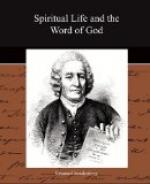For the Word is Divine truth itself, thus Divine wisdom, going forth from the Lord as a sun, and appearing in the heavens as light. Divine truth is the Divine that is called the Holy Spirit, for it not only goes forth from the Lord but it also enlightens man and teaches him, as is said of the Holy Spirit. As the Word in its descent from the Lord has been adapted to the three heavens, and the three heavens are joined together as inmosts are with outmosts through intermediates, so, too, are the three senses of the Word; which shows that the Word is given that by it there may be a conjunction of the heavens with each other, and a conjunction of the heavens with the human race, for whom the sense of the letter is given, which is merely natural and thus the basis of the other three senses. That the ten commandments of the Decalogue are all things of the Word in brief can be seen only from the three senses of those commandments, which are as above stated. (A.E., n. 1024).
What these three senses in the commandments of the Decalogue are can be seen from the following summary explanation. The first commandment, “Thou shalt not worship other gods beside Me,” involves in the spiritual moral sense that nothing else nor anyone else is to be worshipped as Divine; nothing else, that is, Nature, by attributing to it something Divine of itself; nor anyone else, that is, any vicar of the Lord or any saint. In the celestial spiritual sense it involves that one God only is to be acknowledged, and not several according to their qualities, as the ancients did, and as some heathens do at this day, or according to their works, as Christians do at this day, who make out one God because of creation, another because of redemption, and another because of enlightenment.
This commandment in the Divine celestial sense involves that the Lord alone is to be acknowledged and whorshipped, and a trinity in Him, namely, the Divine itself from eternity, which is meant by the Father, the Divine Human born in time, which is meant by the Son of God, and the Divine that goes forth from both, which is meant by the Holy Spirit. These are the three senses of the first commandment in their order. From this commandment viewed in its threefold sense it is clear that it contains and includes in brief all things that concern the essence of the Divine.
The second commandment, “Thou shalt not profane the name of God,” contains and includes in its three senses all things that concern the quality of the Divine, since “the name of God” signifies His quality, which in its first sense is the Word, doctrine from the Word, and worship of the lips and of the life from doctrine; in its second sense it means the Lord’s kingdom on the earth and the Lord’s kingdom in the heavens; and in its third sense it means the Lord’s Divine Human, for this is the quality of the Divine itself.
In the other commandments there are likewise three internal senses for the three heavens; but these, the Lord willing, will be considered elsewhere. (A.E., n. 1025.)




